In the last part we read about how Bheem rid the world of a demon named Bakasur. Also we saw how the Arjun (disguised as a brahmin) won the hand of Draupadi, the Panchal King’s daughter, in marriage. Duryodhana had recognized the victorious brahmin to be Arjun after witnessing his tremendous archery skill.
The Pandavas returned home with Draupadi as Arjuna’s wife. Kunti was waiting for them thinking that her five sons will return home soon with their daily collection of alms.
As soon as they reached their cottage, Yudhishthira called out to Kunti, “Mother! See what we have today!” Kunti was inside and did not see what Yudhishthir was talking about. So she casually replied, “Whatever it is divide it equally among yourselves.” But as soon as she noticed Draupadi she felt highly embarrassed at what she had said. She repented, “My sons, I was under the impression that you had brought something special by way of alms from some benevolent wealthy person. That is why I directed you to share whatever you had procured.”
Once spoken, Kunti’s words could not be taken back and her dedicated five sons took Draupadi as their common wife. Draupadi too accepted the five Pandava brothers as her husbands. By now she had realised that the five brothers were the Pandavas. She was also proud that she was now a part of the royal family of Hastinapur.
It is not very easy to accept whatever is told by the elders; but ‘Dharma’ tells us to do so. The Pandavas were asked to do something unimaginable. But their mother’s word was final for the Pandavas and they followed it! However, when our parents ask us to do little chores, we rebel! Is it correct? We must learn to respect and follow our elders.
After the swayamvara, Draupadi’s brother Dhrushtadyumna stealthily followed the five Brahmin brothers and found out their identities. Happily he returned home and informed his father Drupad that Draupadi had married the Pandavas. King Drupad then decided to celebrate the marriage, wherein the identities of the Pandavas were revealed. King Drupad then became a close ally to the Pandavas.
News of Draupadi’s swayamvar and the true identities of the Brahmins reached Hastinapur. Bhishma advised Dhritarashtra to give half the kingdom to the Pandavas. Duryodhana did not like this idea but kept quiet and decided to wait for another opportunity to present itself to get rid of the Pandavas.
Dhritarashtra listened to Bhishma and sent Vidura, his Prime Minister, to king Drupada’s court. He asked the Pandavas to return to Hastinapur with the promise that they would be treated fairly. The Pandavas agreed and proudly returned along with Kunti and Draupadi. Upon their arrival, the people accorded a grand welcome to the princes. The denizens of Hastinapur were overjoyed that the princes, who had been presumed dead in the fire, were safe and had returned!
The Pandavas bowed down and humbly touched the feet of all their elders – Bhishma, Dhritarashtra, Vidur, Dronacharya and others. Dhritarashtra, consulted his trusted ministers and offered Khandavaprastha to the Pandavas. Yudhishthira, modest and accommodating as he was, accepted the offer and proceeded to Khandavprastha, to set up their own kingdom.
In due course of time, the Pandavas made Indraprastha as the capital of Khandavaprastha. Indraprastha took the shape of a beautiful township with an impressive palace. People were happy and loved their king, Yudhishthira.
Meanwhile to solve the complicated situation of Draupadi having wed the five Pandavas, Narada advised the brothers to draw up a code of conduct whereby none of the others could invade their brother’s privacy when the latter was with Draupadi. Failing which the violator was to go into exile for a period of twelve years.
The dharma abiding Pandava brothers accepted these conditions and life proceeded smoothly until one day, a Brahmin came wailing bitterly. He told Arjuna that thieves had stolen his cows. Arjuna consoled and promised to go after the thieves. But he suddenly realised that his weapons were in Draupadi’s chamber and Yudhishthira was with her at that time. Arjuna was in a dilemma. But he chose to violate the code and accept exile instead of falling short in his duty as a Prince. He walked into Draupadi’s chamber, picked up his bow and quiver, and went after the thieves.
Arjuna returned after restoring the cows to the Brahmin. He straightaway went to his elder brother Yudhishthira and apologised for breaking the code. He said, “I am guilty of violating our mutual agreement and now I seek your permission to go into exile for twelve years.” An aghast Yudhishthira tried to persuade Arjuna to change his mind by arguing that his selfless act of abiding by dharma negated the terms of the agreement. But Arjuna insisted on not making any exception and soon left for the forest.
From Indraprastha, Arjuna first went to the Himalayas and passed his time in the company of sages, attending their discourses and performing the religious rituals.
One day Ulupi, daughter of a Naga king (who was the ruler of the serpent-world) saw Arjuna engaged in his religious pursuits. Arjuna’s handsome personality had always attracted the damsels. Ulupi was no exception. She immediately fell in love and decided to abduct Arjuna and marry him. So, when Arjuna went for a bath in the river, she grabbed him and took him to her father’s under water palace. Arjuna was puzzled by the abduction and asked Ulupi about her intentions.
Ulupi explained, “I am the princess of the Naga kingdom. I am sorry for the inconvenience caused to you. I have brought you here to make you my husband. You have no way to escape.”
Arjuna had no choice. He accepted the proposal offered by Ulupi and stayed with her for a while. Then one day Arjuna appealed to Ulupi the reason for his inability to continue staying with her when he was expected to travel during his period of exile. Ulupi agreed and returned Arjuna to the surface. Before bidding him farewell, she gave Arjuna a boon of protection from the bite of any water creature.
Dear friends, to the Pandavas ‘word was honour’! Arjuna think twice before accepting the consequences of breaking the pact he had with his brothers. Arjuna chose exile despite his intentions being noble. But we often do not accept our own mistakes! Henceforth when someone points our our mistake to us, or we realise we have committed a mistake, let us tell it openly and ask for pardon, shall we?

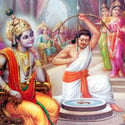 Draupadi Swayamvar
Draupadi Swayamvar Escape from lakshagriha !
Escape from lakshagriha !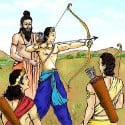 The Princes grow up!
The Princes grow up!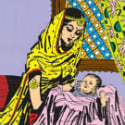 Birth of Pandavas and Kauravas
Birth of Pandavas and Kauravas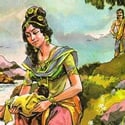 Shantanu and Ganga’s wedding
Shantanu and Ganga’s wedding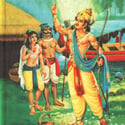 Devavrata becomes Bhishma!
Devavrata becomes Bhishma!